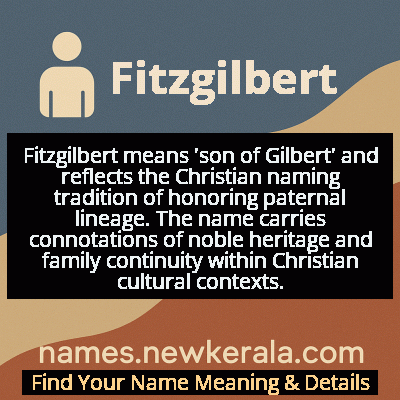Fitzgilbert Name Meaning & Details
Origin, Popularity, Numerology Analysis & Name Meaning of Fitzgilbert
Discover the origin, meaning, and cultural significance of the name FITZGILBERT. Delve into its historical roots and explore the lasting impact it has had on communities and traditions.
Name
Fitzgilbert
Gender
Male
Origin
Christian
Lucky Number
8
Meaning of the Name - Fitzgilbert
Fitzgilbert means 'son of Gilbert' and reflects the Christian naming tradition of honoring paternal lineage. The name carries connotations of noble heritage and family continuity within Christian cultural contexts.
Fitzgilbert - Complete Numerology Analysis
Your Numerology Number
Based on Pythagorean Numerology System
Ruling Planet
Saturn
Positive Nature
Ambitious, efficient, realistic, and authoritative.
Negative Traits
Materialistic, stressed, confrontational, and can be overly ambitious.
Lucky Colours
Dark blue, black.
Lucky Days
Saturday.
Lucky Stones
Blue sapphire, amethyst.
Harmony Numbers
2, 4, 6.
Best Suited Professions
Business leaders, managers, financial services, law enforcement.
What People Like About You
Leadership, determination, organizational skills.
Famous People Named Fitzgilbert
FitzGilbert de Clare
Norman Nobleman
Key figure in Norman conquest of Ireland and founder of several monastic houses
Richard FitzGilbert de Clare
Norman Lord
Known as Strongbow, led the Norman invasion of Ireland and became Lord of Leinster
Walter FitzGilbert
Scottish Knight
Ancestor of the Hamilton family, one of Scotland's most powerful noble families
John FitzGilbert
Marshal of England
Father of William Marshal, served as marshal to Kings Henry I and Stephen
Name Variations & International Equivalents
Click on blue names to explore their detailed meanings. Gray names with will be available soon.
Cultural & Historical Significance
The cultural significance extends beyond mere nomenclature to embody the social and political transformations of medieval Europe. Fitzgilbert names were markers of status and power, often associated with land ownership, military command, and administrative authority. As these Norman families intermarried with local nobility across Britain and Ireland, the name became a symbol of the emerging Anglo-Norman identity that would dominate English and Irish aristocracy for generations. The persistence of Fitzgilbert and similar names in historical records provides valuable insights into medieval genealogy, social mobility, and the gradual assimilation of Norman conquerors into the cultures they dominated. Today, the name serves as a living connection to this pivotal period in European history.
Extended Personality Analysis
Individuals bearing the name Fitzgilbert are often perceived as having a strong sense of heritage and tradition, reflecting the name's noble Norman origins. They typically exhibit leadership qualities, confidence, and a natural authority that hearkens back to the name's aristocratic roots. Many Fitzgilberts demonstrate strategic thinking and organizational skills, mirroring the administrative capabilities that made their namesakes successful feudal lords and military commanders. There's often a blend of practicality and ambition in their character, combined with a deep respect for family legacy and historical continuity.
Beyond these foundational traits, Fitzgilberts often display a unique balance between conservatism and innovation. They tend to be deeply principled individuals who value honor and loyalty, yet they're not afraid to challenge conventions when necessary. The weight of the name often inspires a sense of responsibility - both to uphold family traditions and to make meaningful contributions to society. Many develop strong research and analytical skills, perhaps drawn to history, law, or genealogy. There's also frequently a diplomatic quality to their personality, able to navigate complex social situations with grace and tact. This combination of historical awareness and contemporary adaptability makes them particularly effective in roles that require both tradition and progress.
Modern Usage & Popularity
In contemporary times, Fitzgilbert remains a rare but distinguished name, primarily used by families with Norman ancestry or those seeking a name with strong historical resonance. It's most commonly found in the United Kingdom, Ireland, and among diaspora communities with Anglo-Norman heritage. The name has never achieved widespread popularity in modern naming charts, maintaining its status as an uncommon choice that signals both education and historical awareness. Recent years have seen a slight resurgence in 'Fitz' names as parents seek unique yet traditional options, though Fitzgilbert specifically remains quite rare. It's occasionally used as a middle name to honor family heritage while providing a more conventional first name. The name's usage today reflects a continuing appreciation for medieval history and aristocratic lineage among certain families, particularly those involved in genealogy or historical preservation. Its rarity ensures that bearers of the name stand out while carrying a weight of historical significance.
Symbolic & Spiritual Meanings
Fitzgilbert symbolizes the enduring power of lineage and the transmission of legacy across generations. The 'Fitz' prefix itself carries deep symbolic weight, representing the unbroken chain of paternal descent and the importance of familial identity in shaping individual destiny. The name embodies the concept of 'noblesse oblige' - the idea that privilege and status come with responsibility and duty to others. Symbolically, it connects to themes of inheritance, both literal and metaphorical, suggesting that we carry forward not just genetic material but also cultural traditions, values, and historical consciousness. The name represents a bridge between past and present, serving as a living connection to medieval European history and the complex interplay of Norman, Celtic, and English cultures that shaped the modern world. It stands as a testament to the idea that our identities are woven from the threads of history, and that understanding our origins can provide strength and direction for the future.

